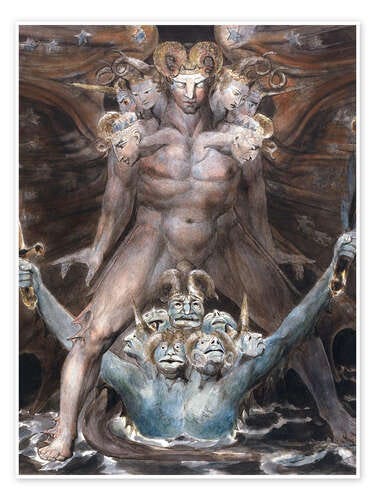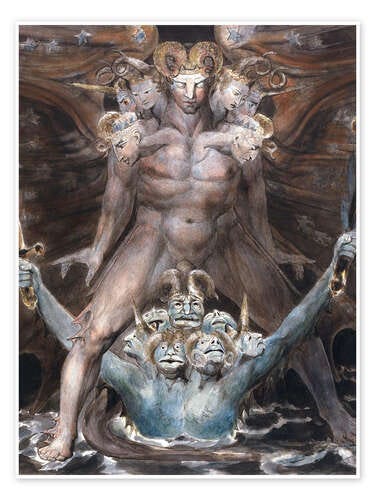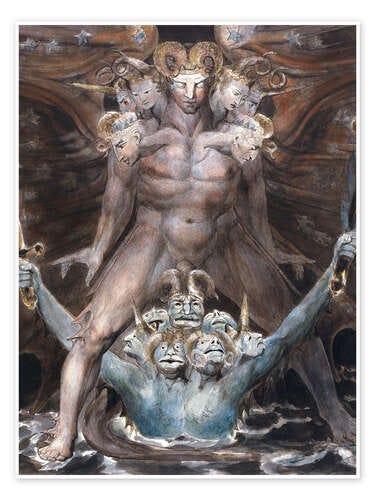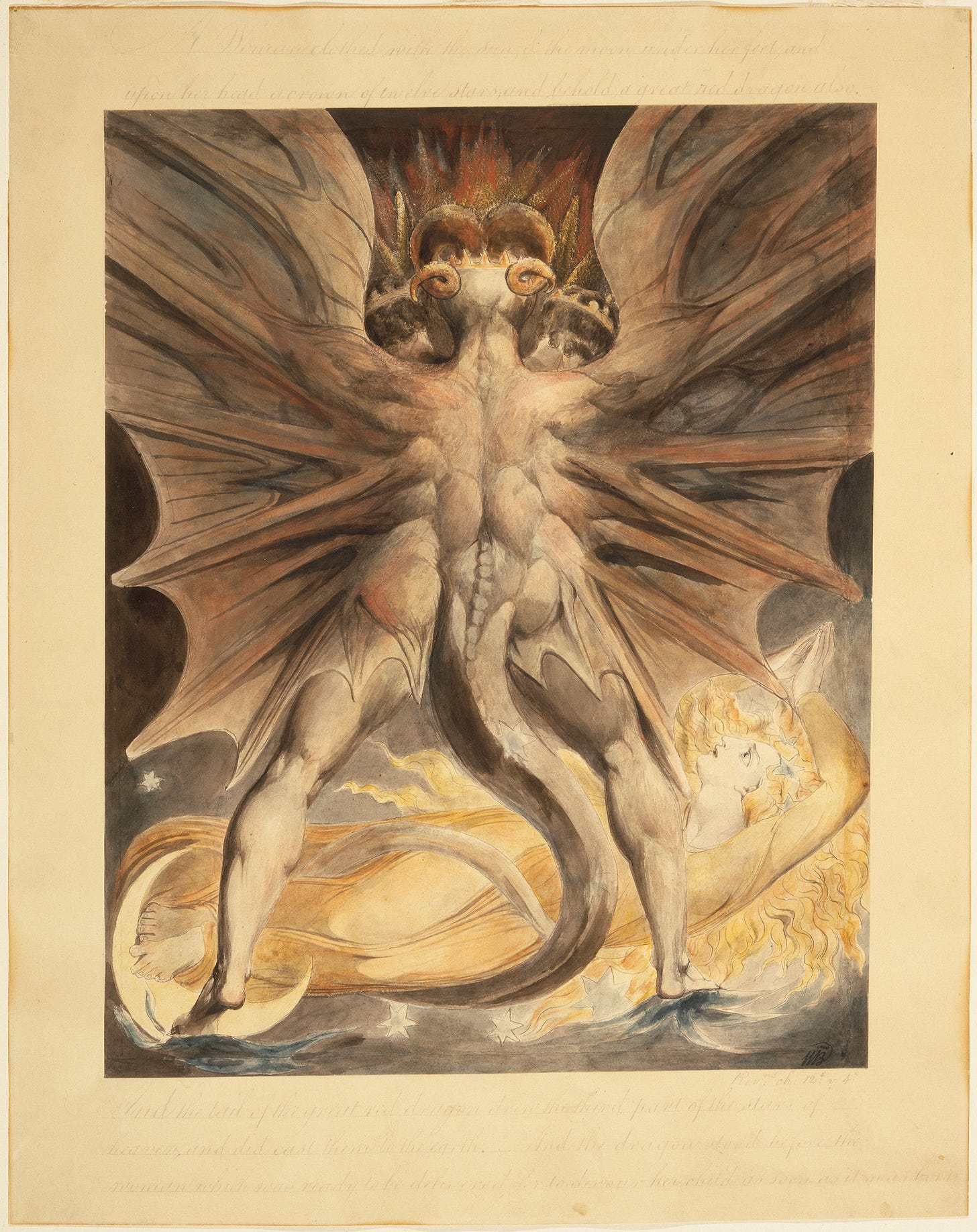Revelation 13.1-10
There is an odd, oft-neglected story in the Old Testament. Faced with the responsibilities of his rule, King David flinches at the Lord’s summons to trust God and God alone for Israel’s well-being. As his friend Jonathon reminds David, “Nothing can hinder the Lord from saving by many or by few.” The former underdog opponent of Goliath should not require such a reminder. Nevertheless, “In God We Trust” may make for a self-justifying sentiment on a dollar bill, but it makes for an impractical governing platform.
Or so King David concludes.
Seeing the vulnerability of the Lord’s chosen nation, with enemies frequently marshaling at their borders, David decides that his kingdom will conduct a census. David sought to take a census of his people; so that, he could raise a proportionate army and thereby protect the nation. But, once again, protecting the nation was not David’s burden to bear, “Is the Lord not powerful enough to protect us?” Interestingly, God’s word attributes this census policy to God’s Enemy. The first verse of 1 Chronicles reports, “Satan stood up against Israel, and incited David to count the people of Israel.”
Satan incited David to count the people.
To reduce those whom the Lord names to numbers is beastly.
To reduce names in the Lord’s Book of Life to numbers in a machine, for the purpose of living in the world as though there is not God— that’s what David was doing— is the manifestation of God’s Enemy.
A census!
An ordinary, everyday, real world practicality.
And yet, 1 Chronicles 21 is the only passage in all of Israel’s scriptures to give the devil a personal name, Satan.
The name appears again at the start of the New Testament. In the Gospel According to Matthew, immediately after John baptizes Jesus in the Jordan River, the Holy Spirit flings the Son into the wilderness in order to be tempted by the Dragon.
Satan confronts Jesus with three ostensible goods:
Feed the hungry— turn these stones to bread.
Lift up the lowly— perform spectacular spiritual feats and confirm the downtrodden’s hope that there is God.
Change the world— take control of the governments of the world.
In his own account of the temptation, Luke writes that having failed to woo the Son of God, Satan departed him “until a more opportune time.”
Do not fail to notice.
Satan may disappear from Jesus in the desert but Satan’s sovereignty over the kingdoms of this world does not likewise disappear.
The devil offers Jesus the governments of this age as though they are his possessions to gift.
And, having failed to entice Jesus with them, the devil departs with them still very much in his grip.
“And authority was given to the beast over every tribe and people and language and nation, and all who dwell on earth will worship it.”
In the gloaming hours of a cold Thursday in February 2022, Marcos Cux, who had only recently been thirteen years old, put on his green rubber overalls and matching jacket, a pair of steel-toed rubber boots, and two pairs of chemical gloves, and left for his cleaning shift at the Perdue slaughterhouse in Accomac County on the Eastern Shore of Virginia.
Every night there is much debris and detritus; the Perdue plant processes over a million chickens every week. Marcos and his team, almost all children, were tasked with sanitizing the slaughterhouse by five in the morning, just before the day’s shipment of chickens in steel cages arrived. Some of the children who worked with Marcos had welts on their bodies that would last for months, burns where the cleaning agents had found tears in their hand-me-down protective equipment.
From a small village in Guatemala, Marcos lives in the Dreamland Trailer Park with his cousin Antonio and her four children. Unable to provide for their son, Marcos’s parents borrowed against their farmland to pay a coyote to bring their son to America. After the the Department of Health and Human Services connected Marcos with his cousin, Marcos borrowed a thousand dollars from her to buy fake papers from a fellow middle school classmate so that he could land a job with the overnight cleaning crew at Perdue. The work paid more than minimum wage, money Marcos wired to his parents back home.
One night in February, just after his fourteenth birthday, Marcos found a piece of torn rubber glove stuck in the conveyor belt of the deboning area. Just as he reached inside to pry it loose, another worker, not seeing Marcos, turned on the machine. Marcos recalled to a reporter that his blood loss was so rapid he did not feel any pain— he was losing consciousness— but that he knew from the alarmed faces that gathered over him that his maiming was very bad.
According to the story in the NY Times:
A supervisor called 911 to report the injury. “We don’t know what to do,” she said, her voice rising. “It’s bleeding out.” The dispatcher ran through a list of questions about his condition. “And how old is that person?” the dispatcher asked.
The supervisor did not respond.
“Even if you had to guess?” he asked.
Still no response.
“Like, 20s? 30s?” he asked.
“Um,” the supervisor said, her voice shaking.
Another moment passed, and the line went dead.”
The Times paints a harrowing picture of the layers of greed and self-interest, fear and indifference, that allow for a child like Marcos to be a mere statistic in a workplace safety report. Perdue, for instance, once sanitized their slaughterhouses themselves but several years ago began contracting with third party cleaning companies to shield themselves from child labor liability. “If companies like this looked too closely at who was working,” one worker told the journalist, “no company would be able to keep going.”
The Department of Health and Human Services never once checked up with Antonia about Marcos, as they had pledged they would, after they placed him in her trailer. A local police officer spoke to Marcos’s teacher about his injury but did not otherwise investigate the incident, saying it was “not a law enforcement matter.” Marcos’s teacher meanwhile admitted to the reporter that she lets her exhausted students sleep in her class, justifying her decision by positing that such students are never going to need to know algebra and trigonometry in any case. Maria Escalante, a U.S.D.A. inspector, confessed that she sees children at the plants she visits and feels bad about the situation. “But,” she insisted, “It’s not my place to say anything.” The following morning local residents whispered about Marcos’s injury but no one spoke up about it or filed a complaint. “There were reasons that supervisors, teachers, federal inspectors and even police officers had said nothing for years about children working at the slaughterhouses…” the NY Times story notes, “If the plants shut down because of a labor scandal, the local economy could collapse.”
The call from the slaughterhouse to the emergency dispatcher that night triggered an alert to the Occupational Safety and Health Administration. Federal officials passed the information to Virginia’s state office to investigate. The state compliance officer instead invited the company to conduct their own investigation. After Marcos’s near fatality, night-shift workers worried their bosses would start firing children but, the Times notes, “the plant kept running more or less as it had been.” The only change was that supervisors stopped letting students leave early to catch the school bus, which struck them as a tacit admission the slaughterhouse was filled with minors.
The author of the Times piece, Hannah Dreier, reports that when Perdue officials got wind of her investigation slaughterhouses around the country began passing out fliers with her photograph, her picture was accompanied by a warning to their employees to keep quiet. As an additional warning, all those who spoke to Hannah Dreier for her story were fired. As a carrot instead of a stick, the company subsequently built an addition to the local library and donated funds to the local government, fire and police.
Surgeons managed to salvage the boy’s arm. After two operations and six months, Marcos is a “rarity” in that rural town; that is, he’s a child who does not work. That he is such a rare statistic is not surprising considering the fact the Department of Labor employs less than a thousand inspectors for over eleven million workplaces.
Given the numbers, a child like Marcos could never not be a mere number.
“And I saw a beast rising out of the sea, having ten horns and seven heads…And the dragon gave it his power and his throne and great authority…In amazement the whole earth followed the beast, saying, ‘Who is like the beast, and who can fight against it?’”
The arresting, prophetic imagery aside, here in the Apocalypse, the Seer sees, simply, nothing other than what 1 Chronicles and the Wilderness Temptation have already shown to us.
The Book of Revelation is bizarre and kaleidoscopic in its visual mode but it is a profound mistake to suppose that its message is otherworldly.
Elaborating upon the Book of Daniel, Revelation 13 documents the second phase of the Dragon’s work in the world. As Satan cannot prevail against either the Son or the Mother of God, he wages war upon her offspring. The devil wages this conflict against Christ’s body by wielding dominion over the world— its kingdoms and systems and institutions— in which the church finds herself.
Straightforwardly, this is what John is given to see.
And so, John reports, the Dragon summons an ally out of the depths. The Dragon beholds his image reflected in the sea— the biblical symbol for chaos and evil— and his act of beholding mysteriously brings forth a reality of its own, the Beast.
Where the prophet Daniel was shown four beasts, representing the Babylonians, the Medes, the Parthians, and the Greeks respectively, the Spirit of Jesus shows John a single beast who bears all the attributes of Daniel’s four. In the Book of Daniel, the prophet makes the allegory transparent. The four beasts are the four kingdoms that have oppressed God’s chosen people. The ten horns on the fourth beast are the ten kings which followed Alexander the Great and the little horn is the last king, Antiochus Epiphanes, the villain at the close of Israel’s scriptures who profaned God’s temple in Jerusalem.
The single beast of Revelation is both the Roman Empire and also every empire.
More importantly, the single beast is the final beast, not merely in the sense of being last in a series but in the sense of disclosing our penultimate reality: a world willingly enslaved to a power that is not God.
This is why Revelation’s Beast is all of Daniel’s beasts rolled into one.
The Beast is not Satan but corresponds to Satan; they’re spiritual equivalents. Thus, both have seven heads and ten horns and both wear crowns. William Blake’s unsettling watercolor of this passage, entitled The Great Red Dragon and the Beast from the Sea, displays the Beast rising up out of the depths into the space between the Dragon’s legs, parodying Mary giving birth to God. The parody extends further in the text. The prophet John refers to Christ in verse four with the Greek word arnion and refers to the Beast with the Greek work therion. The words rhyme. Even at the aural level “the Beast mimics the one he despises.”
Though the term never appears in the Apocalypse, the Beast is antichrist, the Lord Jesus’s opposite, who holds the principalities and powers of this world in his grip.
Just in case there’s any doubt his vision puts us in the realm of the political, the prophet John repeats the word authority (political authority) five times in just ten verses.
The prophet sees those who dwell on the earth offering themselves to the Beast’s service exactly because the Beast’s way in the world appears destined to win out in the end, “Who is like the beast, and who can fight against it?” Or put differently, “If companies like this looked too closely at who was working, no company would be able to keep going.”
Perhaps even more troubling, John is given to see that the Beast is allowed to make war on Christ’s body and even, in this penultimate reality, to conquer it.
The saints lose.
It’s not simply an uphill battle.
Short of the End, we wage a losing campaign.
As Stanley Hauerwas insists repeatedly:
Christianity is not a strategy to make the world come out right.
Our only hope, the Spirit of Jesus shows John, is that we not worship and serve that which we cannot defeat. The baptized, John sees in verse eight, those “whose names have been written in the Book of Life…” will not worship the Beast.
Christ’s body will not beat the Beast.
But neither will his body bow down to the Beast.
We will abide in the way of the Lamb— that’s the promise; that’s the hope.
Hearing about his injury at the slaughterhouse, a school counselor called Marcos’s guardian, Antonia, to inquire about him but Antonia told the counselor that Marcos had fallen at home. “I was nervous to say anything more because of his age,” she said.
The one place Antonia and the other residents of the Dreamland Trailer Park felt free to speak the truth of their plight, to share about the desperate situations that led them to flee their countries for different, desperate situations, was the local Catholic church. Kneeling on the floor in front of the sanctuary’s metal folding chairs, the gathered believers spoke about Marcos and the other maimed and injured children they had known. They freely discussed an industry that turns a blind eye to them, consumers indifferent to them, and a government complicit in it all.
The church’s priest invited them to share their stories.
And then he announced an offering and a Mass for Marcos.
“What I can do,” he said to the reporter, “What we can do right now is bear witness.”
Bear witness against the Beast.
Here in Revelation 13, the Spirit unveils a reality even more mysterious and perplexing than the Beast’s dominion over the Lord’s earth. Namely, the Spirit shows John the “Lamb slain from before the foundation of the world.”
Don’t rush past the claim buried in this brief verse:
“The Lamb slain from before the foundation of the world.”
Not only is there no Lamb who is not slain, there has never not been a Lamb who is slain. Put differently, there is no second person of the Trinity in abstraction. There is no Logos who is not already Mary’s boy. There is no only begotten Son who is not always the hanged man of Golgotha.
As the church father Irenaeus puts it in his treatment of Revelation:
Christ crucified is his own presupposition in God’s eternity.
That is—
It’s not simply that our penultimate reality is one where the kingdoms of this world belong to the devil’s Beast.
It’s that the crucifixion is God’s penultimate Good.
That the Lamb is slain from before the foundation of the world means that God’s work of creation is for his work of redemption.
Irenaeus again:
“Since the Savior was preexistent, it was necessary that what was to be saved came to be, lest the Savior be pointless.”
Or, as Karl Barth echoed the same point, Christ’s death and resurrection for sinners is not to be construed as a:
“wretched expedient…in view of the failure of a plan…that had originally a different intention and form…on the contrary, creation is to prepare the sphere in which the institution and history of the covenant takes place…and the content of this eternal covenant is Jesus Christ just as he appears in the Gospels. God’s eternal decision is made exactly as it is fulfilled and revealed in time. Indeed when God declares his creation good, it is in view of both sides of its destiny, its glorious salvation and the sin from which it needs saving.”
I realize that was a long quote to read, but I think citation of others from the communion of saints is critical because this is a claim you’re liable to dismiss as preposterous when, in fact, it’s simply creedal Christianity.
For instance, Barth merely elaborates the Exultet the church sings during the Easter vigil, “O Happy Fault that merited such and so great a Redeemer!”
The Lamb slain from before the foundation of the world.
In other words—
God creates the world.
So that, God may suffer and die for it.
This is more mysterious than red dragons and seven-headed beasts. Consider, if crucifixion is God’s penultimate Good and if crucifixion is for sin, then, as inconceivable as it might be to us, the sin and fallenness of creation are likewise an intermediate good.
As Robert Jenson writes, paraphrasing Thomas Aquinas:
“It is a corollary of the doctrine of justification that whatever happens happens within the will of God…the notion could never occur to any biblical writer that an event or aspect of history could be outside the Lord’s control.”
That God creates not just the world but the very history in need of redemption sounds shocking to us perhaps but then again it’s the straightforward claim in verse seven of this chapter, “And the Beast was allowed to make war on the saints and to conquer them.”
The NY Times article ends by noting that Marcos is fifteen years old now and he will never again wear short-sleeves. Today he works at a Tysons slaughterhouse.
Whatever happens happens within the will of God.
“This corollary,” Robert Jenson admits candidly, “along with the observation of what actually happens [in history] may drive you to unbelief.”
To follow this Lamb in faith is to accept the contradictions of historical experience as definitive short of the Fulfillment.
The history God makes with us may drive you to unbelief, yet the same history does not stop Antonia and Marcos from kneeling— their hands out, their mouths open— to receive this God in bread and wine.
Faith JUST IS the reality that reality may defeat faith.
“But,” Jenson writes, “if our faith is so sustained by the proclamation of Christ’s crucifixion that it can live in such testing, then no part of human life and the world can then be indifferent for it.”
If our faith is not defeated, our faith cannot be indifferent.
Jenson means—
If the crucifixion is a penultimate good for the purpose of redemption, then the Future, where Jesus now lives with death behind him, should determine how we see and act in the present.
In other words, because the Lamb is slain from before the foundation of the world, Christians should give a damn about the world.
We should bear witness against the Beast.
We should bear witness even if the Lamb alone can beat the Beast.
To take that out of the register of prophecy and make it plain:
Apolitical Christianity is mere unbelief; the god of such a “Christianity” is not the God of the Gospels.
To think—
Just the day before I read Marcos’s name in the Times article, I grumbled at the grocery store about the price of a whole chicken.
The number on the moist, pink tag was the only thing I gave a damn about.
And, just so, I’d been caught in unbelief.
To be sure, the preexistence of the crucified Christ raises perplexing, even unsettling questions.
This is the history God is making with us?
We should seek comfort in what is, in fact, more central to the New Testament— not Christ’s preexistence but his post-existence.
Jesus lives with death behind him.
And from that future, one day all sad things will be made untrue.
And because the King and the Kingdom are one, following Jesus and standing at the doors of this future are the same.
Following Jesus and standing at the doors of the Last Future are equivalent.
Therefore—
Though the Beast may yet rule this present evil age, though you may feel his dominion in the struggles and compromises of your everyday present life, the Last Future draws near every time we follow Jesus’s command, “Take and eat, this is my body broken for you.”




















Share this post